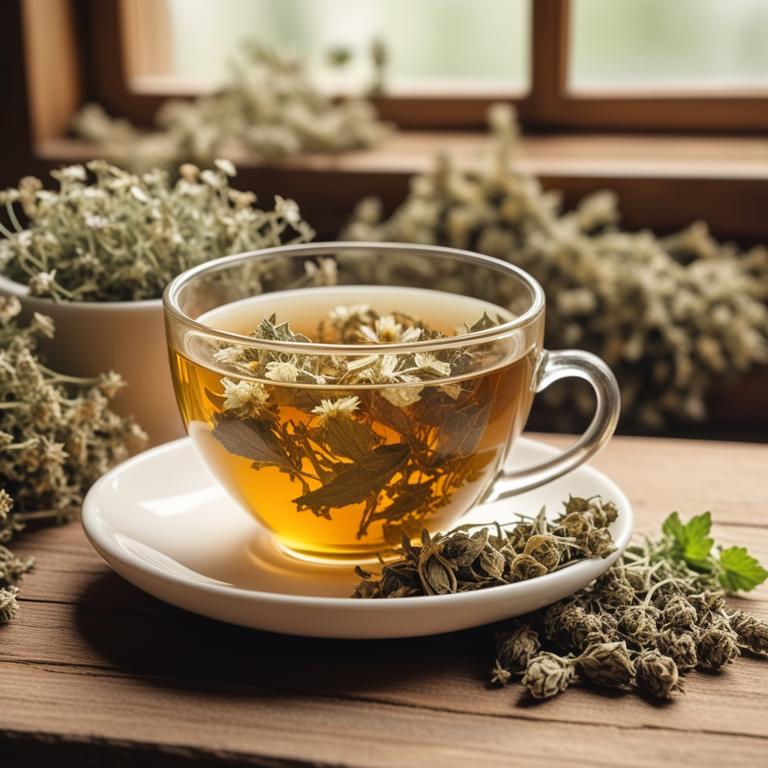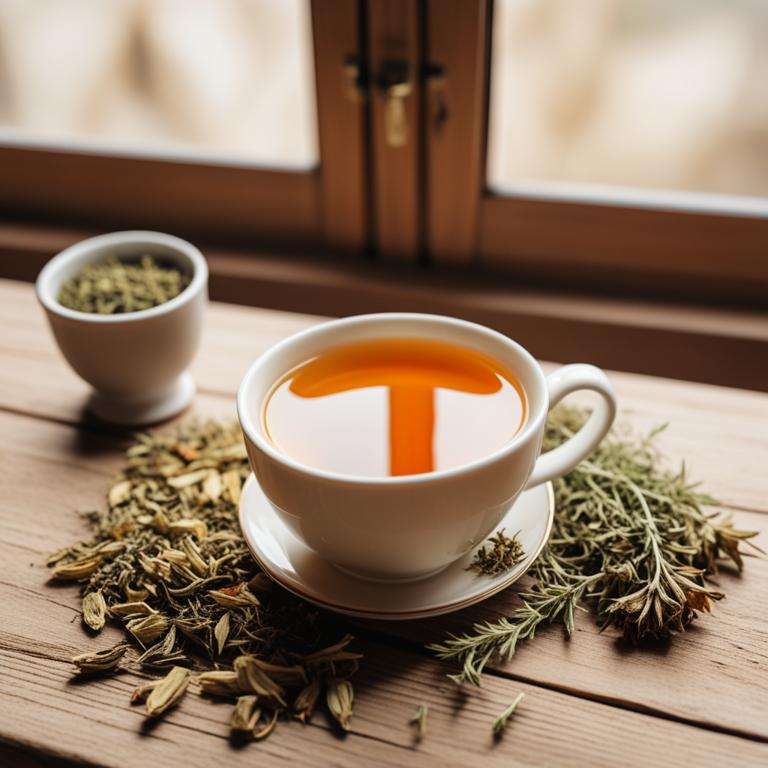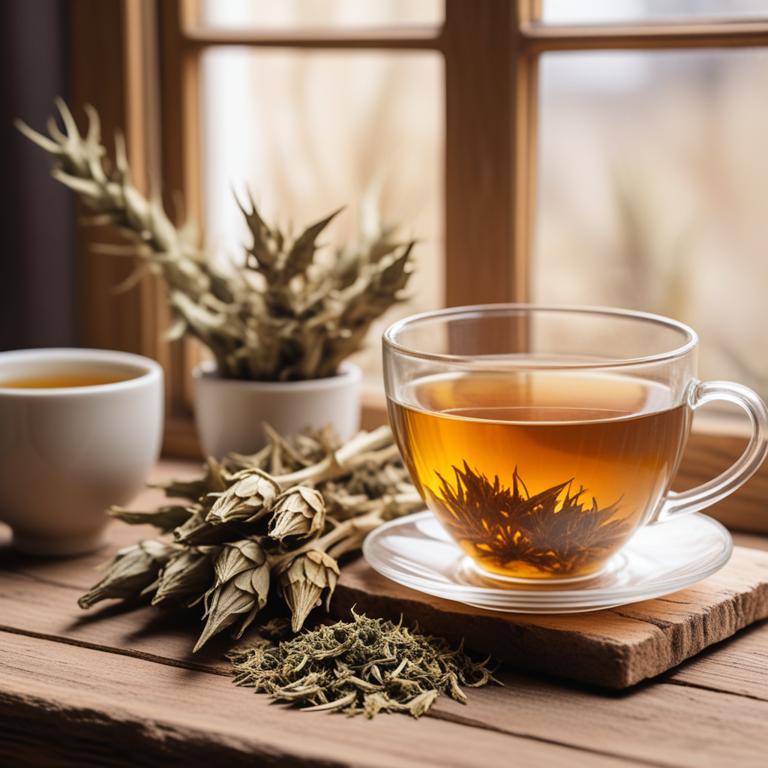7 Best Herbal Teas For High Blood Pressure

Herbal teas for high blood pressure are natural remedies made from plants, leaves, and flowers, which are used to reduce blood pressure levels and alleviate symptoms associated with hypertension.
The benefits of herbal teas for high blood pressure include reducing stress and anxiety, promoting relaxation, and improving cardiovascular health.
Examples of herbal teas that are commonly used to treat high blood pressure include hibiscus tea, which is rich in potassium and can help lower blood pressure, and chamomile tea, which promotes relaxation and reduces stress.
Other examples include ginger tea, which helps to dilate blood vessels and improve circulation, and dandelion tea, which is a natural diuretic that helps to reduce fluid retention and lower blood pressure.
According to "Physiological research", teas for high blood pressure may be beneficial due to the presence of catechins and polyphenols, which can help reduce cardiovascular diseases and improve overall health.
Below there's a list of the 7 best herbal teas for high blood pressure.
- 1. Rauvolfia serpentina teas
- 2. Aloe barbadensis teas
- 3. Cinnamomum verum teas
- 4. Cynara scolymus teas
- 5. Silybum marianum teas
- 6. Curcuma longa teas
- 7. Zingiber officinale teas
Also you may be interested in...
TODAY'S FREE BOUNDLE
Herb Drying Checklist + Herbal Tea Shopping List + Medicinal Herbs Flashcards
Enter you best email address below to receive this bundle (3 product valued $19.95) for FREE + exclusive access to The Aphotecary Letter.
$19.95 -> $0.00
1. Rauvolfia serpentina teas

Rauvolfia serpentina teas have been traditionally used to treat high blood pressure due to their vasodilatory and hypotensive properties, which help to relax blood vessels and reduce blood pressure.
The bioactive constituents of Rauvolfia serpentina, including alkaloids such as reserpine, serpentine, and ajmaline, play a crucial role in treating high blood pressure by blocking the reuptake of neurotransmitters and reducing sympathetic tone.
Regular consumption of Rauvolfia serpentina teas may help to alleviate symptoms of high blood pressure, including headaches, dizziness, and shortness of breath, and reduce the risk of cardiovascular complications.
Overall, Rauvolfia serpentina teas offer a natural and effective alternative for managing high blood pressure, with minimal side effects and no dependency.
Related Study
According to "Natural products and bioprospecting", Rauvolfia serpentina teas for high blood pressure have been identified as one of the herbal medicines with potential anti-hypertensive effects, mentioned in the comprehensive review of various natural herbs used to normalize hypertension.
2. Aloe barbadensis teas

Aloe barbadensis teas have been traditionally used to treat high blood pressure due to their vasodilatory properties, which help to widen blood vessels and improve blood flow.
The bioactive constituents present in Aloe barbadensis, such as aloin and aloe-emodin, have been shown to exhibit antioxidant and anti-inflammatory activities that contribute to the reduction of blood pressure.
Regular consumption of Aloe barbadensis teas has been found to help alleviate symptoms of high blood pressure by promoting relaxation and reducing stress levels, ultimately leading to a decrease in blood pressure.
The benefits of using Aloe barbadensis teas to treat high blood pressure include improved cardiovascular health, reduced risk of cardiovascular diseases, and a natural alternative to conventional medications.
3. Cinnamomum verum teas

Cinnamomum verum teas, also known as Ceylon cinnamon, have been traditionally used to treat high blood pressure due to their vasodilatory, anti-inflammatory, and antioxidant properties.
The bioactive constituents of this herbal preparation, including cinnamaldehyde, cinnamic acid, and eugenol, help to relax blood vessels, reduce blood pressure, and prevent the formation of blood clots.
By consuming Cinnamomum verum teas, individuals can benefit from a reduction in systolic and diastolic blood pressure, improved cardiovascular health, and a decreased risk of cardiovascular disease.
Regular consumption of this herbal preparation has been shown to be effective in managing high blood pressure and promoting overall well-being.
Related Study
According to "Phytomedicine : international journal of phytotherapy and phytopharmacology", Cinnamomum verum teas for high blood pressure are not mentioned in the given study, but C. edulis (Cinnamomum verum is actually C. verum var. zeylanicum) leaf extract induced pronounced endothelium-dependent relaxations and inhibited contractile responses by stimulating the endothelial formation of NO, supporting the folkloric use of C. edulis in hypertension.
4. Cynara scolymus teas

Cynara scolymus teas, also known as artichoke tea, have been used in traditional medicine to help treat high blood pressure due to their diuretic and vasodilatory properties.
The bioactive constituents of Cynara scolymus, including cynarin and silymarin, help to lower blood pressure by reducing sodium retention and improving blood vessel function.
The tea's ability to promote diuresis and improve blood flow can help to alleviate symptoms of high blood pressure, such as headaches and fatigue, and reduce the risk of cardiovascular disease.
Regular consumption of Cynara scolymus tea may also provide additional benefits, including antioxidant and anti-inflammatory effects that can help to protect against cell damage and promote overall cardiovascular health.
Related Study
According to "Journal of traditional and complementary medicine", Cynara scolymus teas for high blood pressure may be beneficial due to its ACE inhibitory activity, which was found to have an IC50 value of 356.62 μg/mL, indicating a potential natural antihypertensive agent.
5. Silybum marianum teas

Silybum marianum teas, also known as milk thistle tea, have been traditionally used to treat high blood pressure due to their diuretic and vasodilatory properties.
The bioactive constituents, including silymarin and flavonoids, help to reduce blood pressure by improving cardiovascular function and increasing the body's ability to remove excess fluids and sodium.
As a result, silybum marianum teas help to lower blood pressure, alleviate symptoms of hypertension, and reduce the risk of cardiovascular complications.
The benefits of using silybum marianum teas to treat high blood pressure include improved cardiovascular health, reduced risk of cardiovascular disease, and a natural alternative to conventional medications.
6. Curcuma longa teas

Curcuma longa teas, derived from the turmeric plant, have been studied for their potential to treat high blood pressure due to their bioactive constituents, including curcumin, demethoxycurcumin, and bisdemethoxycurcumin.
These compounds exhibit potent antioxidant, anti-inflammatory, and vasodilatory properties that help to reduce blood pressure levels by relaxing blood vessels and improving blood flow.
The vasodilatory effect of curcuminoids in Curcuma longa teas may also contribute to their ability to lower blood pressure by increasing nitric oxide production, which in turn causes blood vessels to relax and widen.
Regular consumption of Curcuma longa teas may help to reduce the risk of cardiovascular disease and alleviate symptoms associated with high blood pressure, such as headaches and dizziness.
Related Study
According to "Indian journal of physiology and pharmacology", Curcuma longa teas for high blood pressure may help in reducing cholesterol and triglyceride levels, improving the HDL-cholesterol/total cholesterol ratio, and thus offering protective action against heart disease.
7. Zingiber officinale teas

Zingiber officinale teas, also known as ginger tea, have been traditionally used to treat high blood pressure due to its vasodilatory properties, which help to widen blood vessels and improve blood flow.
The bioactive constituents of ginger tea, such as gingerols and shogaols, have been shown to inhibit the activity of angiotensin-converting enzyme (ACE), a key component in the renin-angiotensin-aldosterone system that regulates blood pressure.
By inhibiting ACE, ginger tea helps to reduce blood pressure and alleviate symptoms associated with hypertension, including headaches and dizziness.
Regular consumption of ginger tea has been found to provide numerous benefits, including improved cardiovascular health, reduced risk of heart disease, and enhanced overall well-being.
Related Study
According to the study, Zingiber officinale teas, when combined with Tribulus terrestris, have been found to have significant anti-hypertensive effects, with a significant decrease in blood pressure observed in Wister rats.